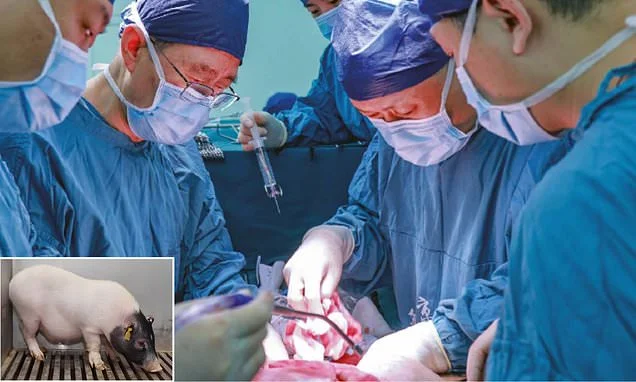In May 2024, Chinese doctors performed the world’s first pig liver transplant at Anhui Medical University’s First Affiliated Hospital.
A 71-year-old man received the organ, marking a milestone in pig liver transplant history.
Patient’s Condition and Procedure
The patient, battling hepatitis B and liver cancer, was ineligible for human liver transplants.
Surgeons used a genetically modified liver from an 11-month-old Diannan miniature pig, engineered to reduce rejection risks.
Initial Success Recorded
For the first month, the pig liver transplant functioned well. It produced bile and clotting proteins without immediate rejection.
This success highlighted the potential of xenotransplantation in medical advancements.
Complications Emerge Later
On day 38, the patient faced xenotransplantation-associated thrombotic microangiopathy, causing immune and blood vessel issues. Despite treatment, recurring internal bleeding led to his death on day 171.
Longest Survival Milestone
The patient survived 171 days, the longest recorded for a pig liver transplant. Lead investigator Beicheng Sun called it a “pivotal step,” proving animal organs can sustain human life for extended periods.
Xenotransplantation’s Promise
Xenotransplantation uses animal organs to address human shortages. Thousands die yearly awaiting liver transplants, with China facing a gap of 6,000 procedures against vast demand. Pig liver transplants offer hope.
Why Pigs Are Ideal
Pigs’ organs match human size and function. Ten genetic modifications in the pig liver reduced immune rejection and clotting risks.
Such advances make pigs prime candidates for pig liver transplant procedures.
Challenges Persist
Immune rejection remains a hurdle. “Coagulation and immune complications need solutions,” Sun noted. Overcoming these is critical for routine pig liver transplant success in future medical practice.
Global Context of Breakthroughs
In 2022, a U.S. patient received a pig heart, surviving two months. In 2024, another received a pig kidney, living nearly two months.
Each case advances pig liver transplant and xenotransplantation research.
Future of Organ Transplants
These milestones bring hope for closing transplant gaps. With genetic and immune suppression advances, pig liver transplants could save countless lives, transforming healthcare by 2027.
Call for Global Attention
The China case underscores xenotransplantation’s potential. Continued research and investment are vital.
Pig liver transplants could redefine organ donation, addressing critical shortages worldwide in 2025 and beyond.




















